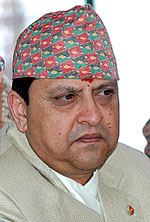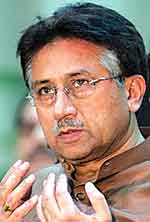 |  |
During the Cold War, American academics cloaked naked power grabs with the Doctrine of State Necessity. It helped the west justify support to tin-pot dictators by: a) that which is otherwise unlawful, necessity makes lawful, b) that the safety of the people is the supreme law, c) the safety of the State is the supreme law.
The state necessity thesis has since been quoted by the advocates of military regimes everywhere to justify almost anything. Nepal's rulers have been ardent adherents of political experiments in Pakistan and it is instructive to look at the implications of this doctrine
in Kathmandu.
The apex court of Pakistan first enunciated the principle in 1955 thus: "Subject to the condition of absoluteness, extremeness and imminence, an act which would otherwise be illegal becomes legal if it is done bona fide under the stress of necessity, the necessity being referable to an intention to preserve the Constitution, the State and the Society and to prevent it from dissolution." If the justification for February First was similar, then it ended up achieving the exact opposite in Nepal.
In 1977, Pakistan's Supreme Court quoted the 1955 judgment to validate the Zia-ul-Haq regime but laid out the grounds of rationalisation in clearer terms. It said that a military takeover could be justified only if it met at least four conditions: a) an imperative and inevitable necessity or exceptional circumstances, b) no other remedy to apply, c) the measure taken must be proportionate to the necessity, and d) it must be of a temporary character limited to the duration of the exceptional circumstances.
To do away with even these four conditions, General Musharraf issued a Provisional Constitution Order, which barred the courts from issuing 'any order against the Chief Executive or any person exercising powers or jurisdiction under his authority'. In justifying the 1999 coup, the court had to resort to Latin, saying: ' salus populi ex supreme lex' (the welfare of the people is the supreme law of any land).
Here in Nepal, the king has failed the test of performance legitimacy. Over the year of his absolute rule, the economy has gone into a tailspin, society is on the verge of disintegration and the polity has all but surrendered to the military. The dark days of long blackouts are back in Nepal after nearly a decade. For the first time since the insurgency began, the spectre of failed state now haunts even most optimistic Nepalis.
The drift towards autocracy began to unfold after 4 October 2002. On 1 February 2005, the experiment climaxed with the military storming into our newsrooms. Now even the media that had given the king the benefit of doubt has lost faith. That perhaps has been the biggest loss of all: February First served moral victory to the Maoists on a silver platter. It proved that their diagnosis of the root cause of evils afflicting Nepali society have been correct all along.
Unfortunately, a corollary to that assumption is that we may have to tolerate totalitarianism to defeat authoritarianism. The madness of the Maoist methods as evidenced by the pointless assassination of a minor political actor like Vijay Lal Das of Janakpur shows that for the comrades, the end still justifies the means.
However, part of their prescription may now be inevitable: a constituent assembly to herald the end of monarchy is an imperative.



